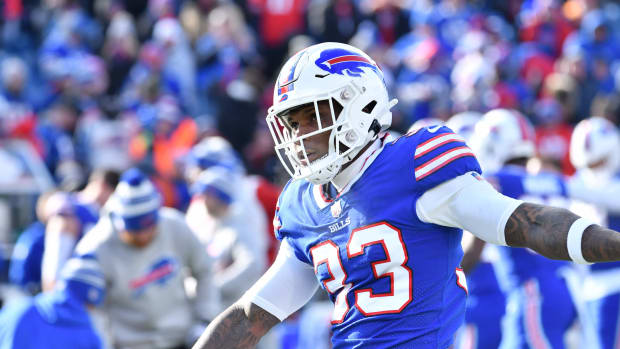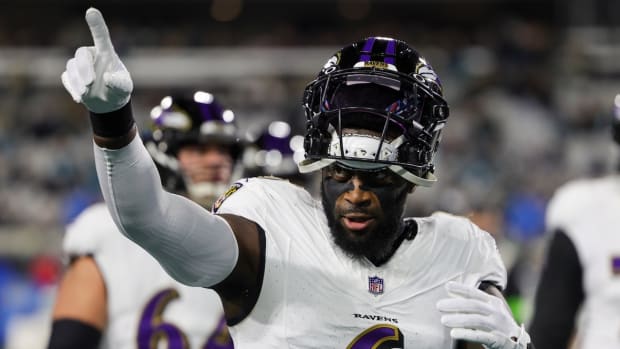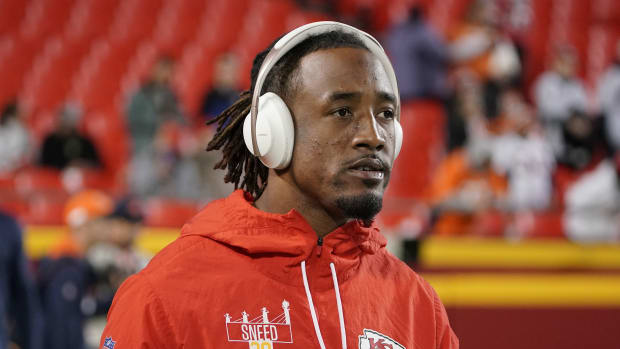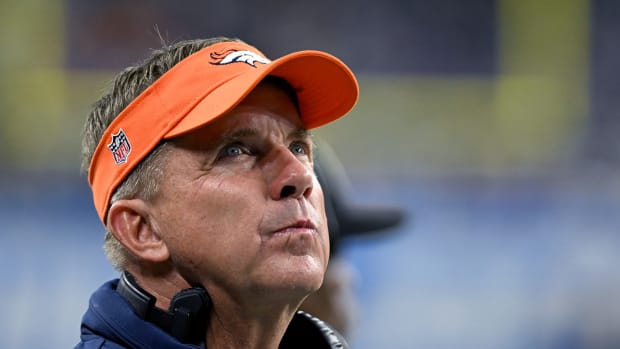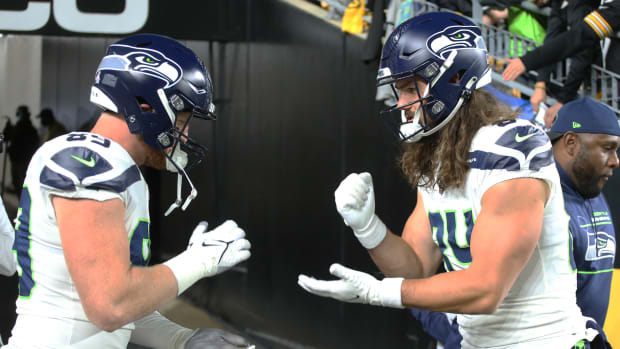Yes, It’s a Big Deal
Brady and Kraft celebrate their fourth Super Bowl title. (Simon Bruty/Sports Illustrated/The MMQB)
The much-anticipated and long-awaited Wells Report is in, and it does not lack in thoroughness. It combines 139 pages of legal and investigatory evidence with 104 pages of scientific and atmospheric data to paint a picture of deceit and rules skirting by members of the Patriots organization. The primary culprits are two lower-level employees—Jim McNally and Jon Jastremski—responsible for the administration and preparation of footballs (they both may be ex-employees by the time you read this). But within the discussion of their actions comes frequent mention of Patriots quarterback Tom Brady, who is implicated in a pattern of behavior of doctoring footballs to his benefit.
Wells writes like the trial lawyer that he is, using the civil litigation phrases such as “more probable than not” and “generally aware of inappropriate activities.” He presents a strong case of circumstantial evidence, fueled by some direct evidence—incriminating texts about tampering routines and Brady's preferences for ball pressure—as well. As much as Patriots fans may disagree, however, (1) the “preponderance of evidence” standard will be enough to warrant discipline from the NFL, and (2) circumstantial evidence does not mean that the evidence is not strong (recall that a former Patriots tight end was recently convicted of murder with only circumstantial evidence). With time and cost not an issue, Wells and his team laid out a trove of circumstantial evidence for the league to consider in potential discipline.
Brady
Brady does not come off well in the report. He was lawyered up and not forthcoming with phone records and information, suggesting he had something to hide. He denied even knowing McNally's name, something the report called out as “not plausible and contradicted by other evidence.” While Wells did not have subpoena power and authority to recover Brady’s phone (much of the text and phone details came from Jastremski's phone, which was property of the Patriots), the lack of cooperation was noted, as it has been in previous NFL investigations. Indeed, the evidence retrieved from McNally and Jastremski puts Brady into the football-tampering scheme. Here is the Report’s money quote: “It is more probable than not that Brady was at least generally aware of the inappropriate activities ofMcNally and Jastremski involving the release of air from Patriots game balls. Evidence ofBrady's awareness appears in text communications between McNally and Jastremski.”
Perhaps even more damning for Brady is evidence of a potential cover-up once the inquiry began after the AFC Championship Game, noted here: “Additional evidence of Brady's awareness includes a material increase in thefrequency of telephone and text communications between Brady and Jastremski shortly aftersuspicions of ball tampering became public on January 19 suggests that Brady was closely monitoring Jastremski.After not communicating by telephone or text for more than six monthsBrady and Jastremski spoke twice on January 19, twice on January 20and twice on January 21 before Jastremski surrendered his cell phone to the Patriots later thatday for forensic imaging.” This is not a good look for Brady.
I would expect a multigame suspension of Brady, perhaps four games (and it would be games, not weeks).
• DID BRADY CHEAT? Peter King on the Deflategate report.
A big deal
I have heard the comments that this is no big deal, the equivalent of a parking ticket. While that may be the view of some, it is not the view of either the NFL or the competing NFL teams. From the league and team perspective, this strikes at the watchword of the commissioner’s office—integrity—and the feeling that every team is operating without advantage. I admit that I’ve been around the NFL for 20 years and had no idea about the rules and procedures governing ball pressure before January. However, as with any rule’s enforcement, I get it; it’s what the teams agree to submit to. If a league is going to stand for anything, it is the foundation that no team is gaining a competitive advantage by playing outside the rules, no matter how great or miniscule the transgression.
As I have stated often in this space, NFL team owners, executives and coaches all have some sense of paranoia about the league office, feeling that it favors other teams over them. I experienced this in Green Bay (our inferiority complex was driven by not having an owner and the clout one would bring). And a team that generates that paranoia perhaps more so than any other is the Patriots, as everyone among the teams is aware of the close relationship between Goodell and Kraft (some NFL executives refer to Kraft as the senior commissioner.) Thus there are a lot of eyes on the potential penalty that will come from this report. While Troy Vincent, who is in charge of football operations, will mete out sanctions, it will obviously be approved and vetted by Goodell and others.
As to Kraft’s statement reasserting his belief the Patriots did nothing wrong and his disappointment in the investigation, that is understandable. No owner wants to be called out in front of his peers, let alone on a national stage. Tom Benson was livid about the Saints’ penalties in 2012; Jerry Jones and Dan Snyder were incensed about their salary cap penalties that same year. It is all part of the job for Goodell; managing the political capital of owners as a collective group, whether close to him personally or not.
• WATCH: How NFL officials check ball pressure and prepare game balls.
Organizational penalty
Beyond a penalty to Brady, which will obviously draw the most attention, I will be very interested in seeing whether the NFL hands down discipline to the Patriots organization. While the report says there is no evidence to suggest Kraft, Bill Belichick or other team leaders "participated in or had knowledge of" wrongdoing (although it does mention some resistance by the Patriots’ legal counsel) there is precedent for discipline despite their lack of involvement. My sense is that, beyond whatever happens to McNally, Jastremski and Brady, there will be a consequence to the Patriots organization
The now-famous line “Ignorance is not an excuse” was held up by Goodell in levying major suspensions to Saints coach Sean Payton and general manager Mickey Loomis in the New Orleans bounty case. And barely a month ago, the NFL suspended Falcons president Rich McKay, holding him responsible as the team’s senior official in game-day operations, although he had no direct knowledge that the Falcons were pumping fake crowd noise into the Georgia Dome. McKay was given a two-month suspension, albeit from the competition committee, not the Falcons, for simply holding the position he does.
Another reason why I would expect an organizational penalty is Goodell’s mantra of punishing a “pattern of behavior.” Spygate was many years ago but it still resonates as a violation of the same principles—integrity and competitive balance. Goodell certainly takes past actions into account with player behavior; I would expect the same here.
To put it in Wells’ legal terms—there will be lawyers—the (voluminous) evidence has now been presented. We wait for the sentencing phase, with Judge Goodell presiding.
• MORE BRANDT: On La’el Collins and other top off-season storylines.
Follow The MMQB on Facebook, Twitter and Instagram.
[widget widget_name="SI Newsletter Widget”]



































